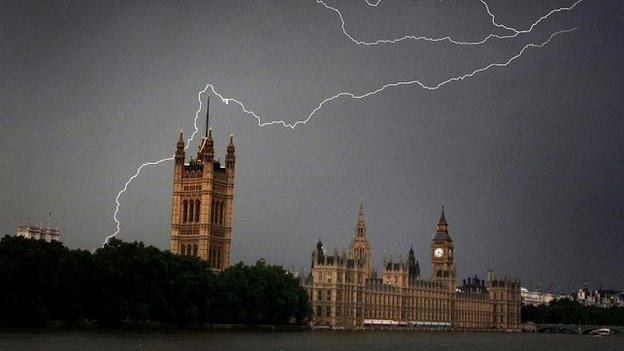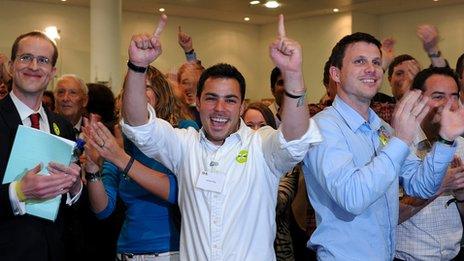Political reform: Has the revolution been cancelled?
- Published

Five years ago at the height of the expenses scandal we were promised a new kind of politics. How's that going?
Politicians often have to eat their own words, but they normally have some clever get-out clause that allows them to claim that they haven't really broken a promise or done a U-turn.
But in the case of the recall of MPs, David Cameron and Nick Clegg are, it appears, bang to rights.
The 2010 coalition agreement said: "We will bring forward early legislation to introduce a power of recall, allowing voters to force a by-election where an MP is found to have engaged in serious wrong-doing and having had a petition calling for a by-election signed by 10% of his or her constituents."
On Thursday evening, we learned that the power of recall has, well, been recalled. There will be no legislation, early or otherwise.
Recriminations are flying around about who is to blame for this.
But it does appear, on the face of it, to be the final nail in the coffin of the wholesale reform of politics promised by all party leaders in the wake of the 2008 expenses scandal.

The expenses scandal prompted a push for wholesale reforms
What heady days they were.
The political classes were so shocked by the public backlash over expenses that they were suddenly prepared to contemplate all kinds of ideas previously rejected as wild and impractical.
Anything to shake the rapidly solidifying impression that they were a smug, out-of-touch elite only interested in lining their own pockets.
''What I have seen offends my Presbyterian conscience; what I have seen is something that is appalling," said Gordon Brown as he set out details of a Constitutional Renewal Bill.
"The central objective of the new politics we need should be a massive, sweeping, radical redistribution of power," said David Cameron, in an opinion piece for The Guardian, external.
Zac Goldsmith: "David Cameron has behaved appallingly over this"
"For decades, political reformers have been thwarted by the inertia of Westminster. But the expenses scandal has overturned old certainties and made change possible. This moment must be seized by all those who want a different kind of politics in Britain," said Nick Clegg.
The coalition agreement, external promised to fix Britain's "broken" political system, adding: "We urgently need fundamental political reform, including a referendum on electoral reform, much greater co-operation across party lines, and changes to our political system to make it far more transparent and accountable."
What remains of that agenda now?
Many smaller items have been ticked off the list - such as online petitions that can trigger debates in Parliament and a backbench business committee in the Commons.
Individual voter registration is also going ahead, as part of efforts to tackle electoral fraud.
And fixed-term parliaments - to end the supposed advantage the ruling party has in choosing the election date - are now a fact of life.
We have also had a referendum on changing the voting system for general elections (remember that?), which resulted in a resounding defeat for those who wanted to scrap the traditional first-past-the post system.

No-to-AV campaigners celebrate their referendum victory
But the promise of a partly or wholly elected House of Lords lies in tatters.
And there is no sign of the 200 all-postal primaries "targeted at seats which have not changed hands for many years".
Big city mayors - a Boris for every city, as David Cameron memorably described it - have also fallen by the wayside after a series of referendums.
Lib Dem commentator Mark Pack says the coalition gets nine out of 10 for effort, but only four out of 10 for achievement.
He says: "One of the reasons it has not changed massively is that the real, genuine public anger over expenses did not convert into sustained public demand for changes in the way that the system operates. It is a shame."
Conservative MP Douglas Carswell is in no doubt that the decision to drop recall represents the death knell for the reform agenda. For now.
"It is bitterly disappointing. It is, I think, a very significant moment," says the maverick backbencher.
"Political reform, at the time of the expenses crisis, was offered by all three party leaders, even Gordon Brown. The coalition could have been extraordinarily radical on this.
"This government could have been different, but I think this marks the moment at which it becomes just another administration."
The problem, argues Mr Carswell, is that the reform agenda was "hijacked by the political class".
They wasted valuable time on things they cared about, such as Alternative Vote and an elected second chamber, but which the public could not care less about, he says.
But reforms that would really have made a difference, such as the giving the public the power to sack their MP, were booted into the long grass, falling victim to the Westminster inertia Nick Clegg once railed against.
"The country is run by a clique sitting on a sofa - and the clique sitting on a sofa don't want to change things," says Mr Carswell.
"They have given us the political reforms the Westminster club wants."
But, he adds, it is only a matter of time before change comes to the British political system: "Spring is on its way and these ideas will be coming back."
What about the argument that MPs were never seriously going to pass a law that would make it easier to be kicked out of their jobs?
"Turkeys don't vote for Christmas but December 25 still happens," he says.
- Published14 February 2014